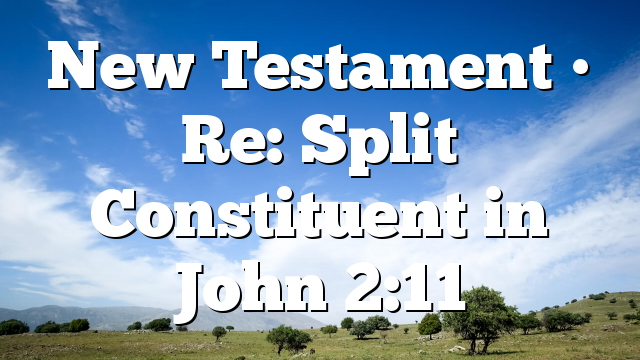Stephen Carlson wrote:
David Lim wrote:Like Carl, I take “δια την αληθειαν” to modify “αγαπω”. If I were to give a reason it would be that it is an adverbial prepositional phrase and must modify a verb form, and the nearest one that fits would be “αγαπω” (not “εγνωκοτες”).
Well, there are three possible verbal forms to pick from in order of proximity, ἐγνωκότες, ἀγαπῶ, and the implied γράφει/γράφω. I don’t quite see how it fits better with ἀγαπῶ than with γράφω, however. I can see how giving a reason fits better with writing than with loving, but how would it work with your option: I love you in truth on account of the truth abiding in us? Please explain this further.
I think my explanation wasn’t clear enough. I took “the truth that remains in us” to refer to “the instruction (singular abstract noun) from God that remains in us”, which includes the laws, teachings, revelations, … In the writer’s views, it is natural for anyone, not just him, who loves the laws and teachings of God, to also love “the chosen lady”, and it is not just any type of love (which may be based on many things) but love that is based on truth. What it means for love to be based on truth is explained by the writer later, that it is a very logical thing (now this is going to be slightly interpretive):
[1 John 4:21] and this commandment we have from him: that the [one] who loves God is to love also his brother.
[1 John 5:2] in this we know that we love the children of God: when we love God and keep his commandments.
In the first statement he says that to love his brothers (including the chosen lady) is actually a commandment from God (which is part of “the truth”).
In the second statement he says that by loving God and keeping his commandments we love the children of God, which is a natural consequence of the first statement.
This is the way the love is “because of the truth”.
Stephen Carlson wrote:
David Lim wrote:I would take it to be a separate statement, with the focus on the whole “μεθ ημων εις τον αιωνα”. But I’m curious as to the suggested possibility that “εσται” represents the future participle; are there any examples you know that indicate the existence of such a phenomenon of finite verbs that seem to take the place of participles?
The statement about “focus” is confusing, because it is a technical term (where only μεθ’ ἡμῶν is in focus, based on fronting: the whole statement is not focus). As for the other issues, there is a certain parallelism between stating that the truth abides within us and then asserting that it will be with us forever. The parallelism of thought, however, is broken by the switch from participle to finite verb form. As you know, participles often do the work of finite verbs.
Indeed participles can easily take the place of finite verbs in various ways, but I understood you (and I think Carl also) to mean that “εσται” functions as a participle, which is the reverse direction. For that I would like to see some examples if you know of any.
Stephen Carlson wrote:
David Lim wrote:I understand “εν αληθεια” similarly as “in truth” (“according to what is true”), while “η αληθεια” here refers to “the truth” (“the commandments/teachings/revelations from God”). The former is indefinite, which is why it is the latter that is described as “remaining in us”. Of course, in this context the former implicitly refers to the latter; “it is because of the instruction from God that we keep in our hearts, which is truth, that we love the chosen lady, and not just I but also all the ones who have received this instruction, and this instruction will remain with us for ever.”
This explanation is a little confusing if not contradictory, because it is asserted that the former is indefinite but also that it refers to something identifiable. How can it be both? At any rate, I was thinking about the NET Bible’s note on the former:
The prepositional phrase ἐν ἀληθείᾳ (en alhqeia) in 2 John 1 is similar to 3 John 1, although it is not qualified there as it is here (see 3 John 1). This is not merely the equivalent of an adverb (“truly”), but is a theological statement affirming the orthodoxy of Gaius, to whom the letter is addressed. “Truth” is the author’s way of alluding to theological orthodoxy in the face of the challenge by the opponents (see 1 John 3:19).
Aside from the confusion over which of the little Johns is addressed to Gaius, they take the phrase ἐν ἀληθείᾳ not be merely adverbial but a reference to orthodoxy. I think you’re doing similar but also trying to have the adverbial usage too?
I do take it as adverbial, but I think it remains an indefinite reference. It is possible for an indefinite reference and a definite reference to refer to essentially the same thing because of the context, though in general it is not the case. For example, we can say “God has power.”, where “power” is indefinite in the sentence itself. At the same time “the power of God” is definite. In the former, we could argue that the indefinite “power” refers to power in general that others may also have, but it is also true that in such contexts we are usually talking about God’s power and not about power in general, so in the end it refers indirectly to the same as the definite reference. In the same way, the indefinite “truth” in “in truth” refers to truth in general, which is why I tried to explain the phrase as “according to what is true” to bring out the indefiniteness. Of course, the context tells us that the writer is not just talking about doing things according to what is true in general, but doing things according to a specific “truth” which appears to refer to “instruction from God”.
Statistics: Posted by David Lim — January 13th, 2014, 10:14 pm



















